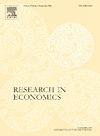Regime-dependent health care employment dynamics in recessions
IF 1.3
Q3 ECONOMICS
引用次数: 0
Abstract
We relax the assumption that recessions are all alike in studying whether U.S. health care employment is recession-proof. Because health care services are inelastic and largely driven by costs, we argue that economic conditions influence health care employment only to the extent that they significantly affect health care wage growth. Using U.S. monthly data for 1990–2022, we estimate a threshold vector autoregression that allows for regime-dependent negative demand and negative supply shocks in examining the response of health care employment growth in recessionary periods. When wage growth is high as determined by an endogenously-estimated threshold, we find a large and significant reduction in health care employment growth during demand-induced recessions and a smaller decline during supply-induced recessions. Meanwhile, health care employment growth does not respond significantly to negative demand or supply shocks in the low-cost regime. Further, a disaggregated analysis evidences large heterogeneity across sub-sectors. In this way, our findings reveal that both the source of the shock and health care wage growth are important in explaining health care employment dynamics. Thus, health care organizations that are more labor cost efficient will be more insulated from economic disruptions.
经济衰退中依赖体制的医疗保健就业动态
在研究美国医疗保健就业是否不受经济衰退影响时,我们放宽了所有经济衰退都相似的假设。由于医疗保健服务缺乏弹性,且主要受成本驱动,因此我们认为,经济条件仅在显著影响医疗保健工资增长的程度上影响医疗保健就业。使用美国1990-2022年的月度数据,我们估计了一个阈值向量自回归,该自回归允许在检查经济衰退时期医疗保健就业增长的反应时,存在与制度相关的负需求和负供应冲击。当工资增长由内源性估计阈值决定时,我们发现,在需求引起的衰退期间,医疗保健就业增长大幅显著减少,而在供应引起的衰退期间,下降幅度较小。与此同时,医疗保健就业增长对低成本制度的负面需求或供应冲击没有显著反应。此外,分类分析表明,子行业之间存在很大的异质性。通过这种方式,我们的研究结果表明,冲击的来源和医疗保健工资增长都是解释医疗保健就业动态的重要因素。因此,劳动力成本效率更高的医疗保健组织将更不受经济动荡的影响。
本文章由计算机程序翻译,如有差异,请以英文原文为准。
求助全文
约1分钟内获得全文
求助全文
来源期刊

Research in Economics
ECONOMICS-
CiteScore
1.40
自引率
0.00%
发文量
37
审稿时长
89 days
期刊介绍:
Established in 1947, Research in Economics is one of the oldest general-interest economics journals in the world and the main one among those based in Italy. The purpose of the journal is to select original theoretical and empirical articles that will have high impact on the debate in the social sciences; since 1947, it has published important research contributions on a wide range of topics. A summary of our editorial policy is this: the editors make a preliminary assessment of whether the results of a paper, if correct, are worth publishing. If so one of the associate editors reviews the paper: from the reviewer we expect to learn if the paper is understandable and coherent and - within reasonable bounds - the results are correct. We believe that long lags in publication and multiple demands for revision simply slow scientific progress. Our goal is to provide you a definitive answer within one month of submission. We give the editors one week to judge the overall contribution and if acceptable send your paper to an associate editor. We expect the associate editor to provide a more detailed evaluation within three weeks so that the editors can make a final decision before the month expires. In the (rare) case of a revision we allow four months and in the case of conditional acceptance we allow two months to submit the final version. In both cases we expect a cover letter explaining how you met the requirements. For conditional acceptance the editors will verify that the requirements were met. In the case of revision the original associate editor will do so. If the revision cannot be at least conditionally accepted it is rejected: there is no second revision.
 求助内容:
求助内容: 应助结果提醒方式:
应助结果提醒方式:


